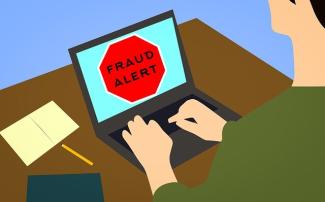
Social Security Scammers
February 15, 2020
By: John Zeltmann
Recently I received a very helpful email from Social Security, filled with tips on how to avoid scams related to my Social Security account. Everything in the email seemed legit:
"If you get a suspicious call from Social Security, hang up and report it!" (A helpful link was even provided so I could easily report scams.)
"What to look out for in a scam: a Social Security agent requesting your Social Security number, someone asking you to pay a fine or debt to Social Security due to earnings reconciliations, calls threatening arrest" (Once again, another helpful link was provided.)
It was almost as though it was explicitly designed to put me at ease, inviting me into thinking whoever wrote the email had my best intentions in mind.
That’s because it was.
Social Security identity theft scams come in many shapes and sizes. In my case, I received a spoof email masquerading as the Social Security Administration, also known as phishing.
How did I know it was a spoof? I hovered my mouse pointer over the links provided and looked at the link preview in the lower left-hand corner of my screen. (IMPORTANT: hovering over is not clicking on, the latter of which can potentially result in viruses being downloaded to your computer) It was an unrecognizable mishmash of letters and numbers that did not include anything that resembled the Social Security Administration's website. If I were to click any of those "helpful" links, the outcome likely would have ranged from the innocuous (e.g., my email being added to a marketing list) to the catastrophic (e.g., a virus downloaded to my computer).
According to AARP's website1, here are some helpful tips to consider when navigating Social Security phishing attempts directed at you:
Warning Signs
- You get an unsolicited call from someone claiming to work for the Social Security Administration: Except in rare circumstances, you will not get a call from Social Security unless you have already been in contact with the agency.
- The caller asks for your Social Security number: Why would anyone working at Social Security need to ask you for your number?
- A caller or email threatens consequences, such as arrest, loss of benefits, or suspension of your Social Security number, if you do not provide a payment or personal information: This would never happen from an agency employee.
Do's
- Do hang up if someone calls you out of the blue and claims to be from SSA.
- Do be skeptical if a caller claims to be an “officer with the Inspector General of Social Security.” Scammers create official-sounding and often actual government titles to make a ruse seem authentic.
- Do set up a My Social Security account online (at ssa.gov) and check it monthly for signs of anything unusual, even if you have not yet started collecting benefits.
- Do install a robocall-blocking app on your smartphone, or sign up for a robocall-blocking service from your mobile network provider.
Don'ts
- Don’t call a phone number left on your voice mail by a robocaller. If you want to contact SSA, call the customer service line at 800-772-1213.
- Don’t assume a call is legitimate because it appears to come from 800-772-1213. Scammers use “spoofing” technology to trick caller ID.
- Don’t give your Social Security number or other personal information to someone who contacts you by email. SSA never requests information that way.
- Don’t click links in purported SSA emails without checking them. Mouse over the link to reveal the actual destination address. The main part of the address should end with “.gov/” — including the forward slash. If there’s anything between .gov and the slash, it’s fake.

